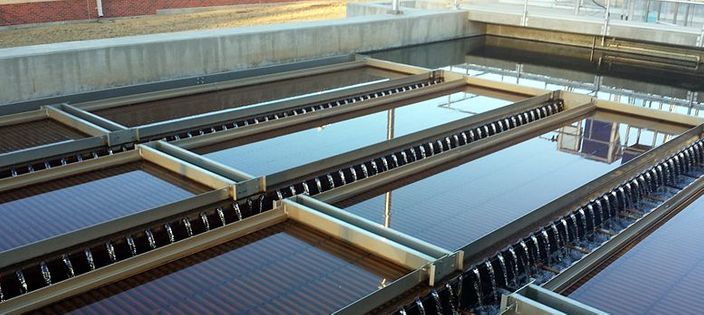Wastewater problem could cost City of Fort Smith more than $25 million
by February 7, 2024 5:22 pm 1,149 views

The City of Fort Smith may have to spend more than $25 million to fix a wastewater problem that has placed the city under an administrative consent order with the Arkansas Department of Environmental Quality (ADEQ).
Wastewater violations in the city between May and October 2023 resulted in the state’s administrative order, which the Fort Smith Board of Directors approved Tuesday (Feb. 7).
In May 2023, the Massard Treatment Plant was unable to meet the ammonia-nitrogen permit limits set forth in the current National Pollutant Discharge Elimination System (NPDES) permit, Utilities Director Lance McAvoy said in a memo. The city violated a seven-day average, a monthly concentration average and a monthly average loading of the approved levels, McAvoy told the board Tuesday night.
The seven day average of ammonia-nitrogen was 41% over allowed levels, McAvoy said. The average concentration levels over a 30 day period was about 202% over the allowable levels, he said. The levels were over allowable levels in May, June, July, August and October. Prior to this, the city had been in compliance with the levels since around 2016, McAvoy said.
“Staff began immediately in May 2023 to ascertain the cause of the elevated ammonia values. This included additional testing at the treatment facility, testing of incoming wastewater, and surveys and testing of industries whose waste stream flows to Massard,” the memo said. “Staff also began to augment the biological treatment by adding nitrifying microorganisms (those ‘bugs’ that eat ammonia-nitrogen) to the aeration basin.”
With the exception of September, the actions were met with limited success. On Aug. 21, the Water Utilities Department requested ADEQ to allow the city to enter into a voluntary Corrective Action Plan (CAP). An additional request was made to be placed under a consent administrative order with a suspended $3,600 penalty to address the violations and incorporate the voluntary CAP, McAvoy said. ADEQ agreed to waive or suspend the penalties until the city could find out what was going on with their treatment plant to cause the levels, he said.
“It is much like we do with industries that are in noncompliance, we will suspend that and (they) can show that they invested the money into their treatment facility to come back into compliance. We asked for the same thing,” McAvoy said.
The city then contracted with Garver on developing a solution. They chose to work with Garver because of the company’s depth of knowledge of the Massard Plant and their experience in working on CAPs, McAvoy said. The board approved a $145,000 contract with Garver.
Water Utilities staff and Garver are working on a two phase approach to correct the problem. The first phase utilizes existing plant infrastructure, which McAvoy said is a relatively low-cost, short-term fix staff will use while working on a permanent solution. The second phase is to build a new aeration basin, which McAvoy said is greatly needed.
The short term fix, which staff is working on, will put smaller basins that have been decommissioned back into service and will cost under $300,000. McAvoy said he hopes this will work as a bandaid until the city can find funding for up to $25 million needed to build a new aeration basin.
Director Kevin Settle said entering into the agreement gave him an “eerie feeling of the consent decree.” McAvoy said the difference between a consent administrative order and a consent decree is that the order is between the city and the state while a consent decree is ordered by the courts.
City Administrator Carl Geffken said entering the agreement and addressing the issue now would allow the city to be proactive and keep things from reaching a point when a consent decree is necessary.
During the winter months, there are no limits on ammonia-nitrogen levels, McAvoy said. The levels will begin to be monitored again May 1. If all equipment is delivered in time and nothing slows work, the temporary fix should be up and going by the end of March, McAvoy said.
The bacteria the city uses to treat the water works best if water is at 85 degrees. Currently, the water in the aeration basin is around 50-60 degrees. In the past the city used a blower that produced enough heat to keep the water at adequate temperatures for the bacteria to work properly, McAvoy said. In 2022, that blower quit working, and parts are no longer available to fix it. The new blowers the city purchased to replace it do not produce the same amount of heat, which resulted in the high levels of ammonia-nitrate, McAvoy said.
Settle suggested that the fix would be to add heat exchangers rather than building a new aeration basin.
The motion to enter into the consent administrative order passed by a vote five to two with Settle voting against the action and Director George Catsavis abstaining from the vote.
The city is already operating under a federal consent decree. After years of failing to maintain water and sewer infrastructure to federal standards, the city entered into a federal consent decree with the U.S. Environmental Protection Agency (EPA) and U.S. Department of Justice in late 2014. The consent decree required the city to make an estimated $480 million worth of sewer upgrades over the course of 12 years.
